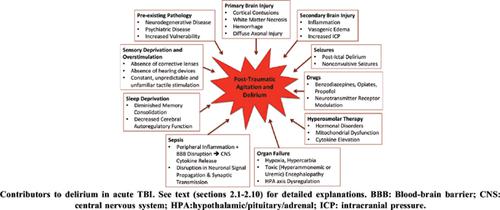Current Neuropharmacology ( IF 4.8 ) Pub Date : 2021-08-31 , DOI: 10.2174/1570159x19666210119153839 Shawniqua Williams Roberson 1 , Mayur B Patel 1 , Wojciech Dabrowski 2 , E Wesley Ely 1 , Cezary Pakulski 3 , Katarzyna Kotfis 4

|
Traumatic brain injury (TBI) can initiate a very complex disease of the central nervous system (CNS), starting with the primary pathology of the inciting trauma and subsequent inflammatory and CNS tissue response. Delirium has long been regarded as an almost inevitable consequence of moderate to severe TBI, but more recently has been recognized as an organ dysfunction syndrome with potentially mitigating interventions. The diagnosis of delirium is independently associated with prolonged hospitalization, increased mortality and worse cognitive outcome across critically ill populations. Investigation of the unique problems and management challenges of TBI patients is needed to reduce the burden of delirium in this population.
In this narrative review, possible etiologic mechanisms behind post-traumatic delirium are discussed, including primary injury to structures mediating arousal and attention and secondary injury due to progressive inflammatory destruction of the brain parenchyma. Other potential etiologic contributors include dysregulation of neurotransmission due to intravenous sedatives, seizures, organ failure, sleep cycle disruption or other delirium risk factors. Delirium screening can be accomplished in TBI patients and the presence of delirium portends worse outcomes.
There is evidence that multi-component care bundles including an analgesia-prioritized sedation algorithm, regular spontaneous awakening and breathing trials, protocolized delirium assessment, early mobility and family engagement can reduce the burden of ICU delirium. The aim of this review is to summarize the approach to delirium in TBI patients with an emphasis on pathogenesis and management. Emerging CNS-active drug therapies that show promise in preclinical studies are highlighted.
中文翻译:

脑外伤患者谵妄管理的挑战:从病理生理学到临床实践
创伤性脑损伤 (TBI) 可引发一种非常复杂的中枢神经系统 (CNS) 疾病,首先是引发创伤的主要病理学,然后是炎症和 CNS 组织反应。长期以来,谵妄一直被认为是中度至重度创伤性脑损伤几乎不可避免的后果,但最近被认为是一种器官功能障碍综合征,可以通过潜在的干预措施缓解。谵妄的诊断与重症患者住院时间延长、死亡率增加和认知结果恶化独立相关。需要调查 TBI 患者的独特问题和管理挑战,以减轻该人群的谵妄负担。
在这篇叙述性综述中,讨论了创伤后谵妄背后可能的病因机制,包括介导觉醒和注意力的结构的原发性损伤以及由于脑实质的进行性炎症破坏而导致的继发性损伤。其他潜在的病因包括静脉注射镇静剂导致的神经传递失调、癫痫发作、器官衰竭、睡眠周期中断或其他谵妄危险因素。 TBI 患者可以进行谵妄筛查,谵妄的存在预示着更糟糕的结果。
有证据表明,包括镇痛优先的镇静算法、定期自主觉醒和呼吸试验、方案化谵妄评估、早期活动和家庭参与在内的多组成部分护理组合可以减轻 ICU 谵妄的负担。本综述的目的是总结 TBI 患者谵妄的治疗方法,重点是发病机制和治疗。强调了在临床前研究中显示出前景的新兴中枢神经系统活性药物疗法。










































 京公网安备 11010802027423号
京公网安备 11010802027423号